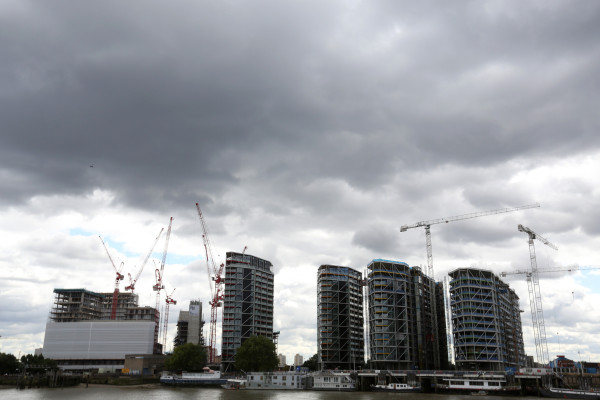

Campaigners led by Woolwich leaseholder Steve Day have created what they believe to be a solution to the cladding remediation costs currently threatening many of them with bankruptcy.
The issue has also created an estimated 2m mortgage prisoners who are unable to sell their homes because lenders refuse to lend to those interested in buying their flats because of concerns about cladding.
The amendment was dubbed a “matter of such importance” by the Earl of Lytton in the House of Lords last month, and has since been signed off by Daniel Greenberg - a parliamentary counsel acting in a private capacity on the bill.
It would place the responsibility of remediation costs on those who failed to make the grade in construction standards - rather than on leaseholders.
Called the ‘Polluter Pays Bill’, the scheme would work alongside the government’s grant schemes which are backed by £5.1bn in public funding remediation.
This money would be used to foot the initial bill. But over time, building companies would pay the government back based on the Building Safety Fund - a document which sets out how to calculate which parties are responsible for unsafe cladding and to what degree.
Day told FTAdviser this would provide lenders with a remediation plan and route to redress - something they have been lacking until now, hence leading to market-wide “log jams”.
“This would see the insurance and lending industries utterly unlocked”, said Day.
Addressing the issue in the House of Lords, government minister Lord Greenhalgh said: "we are very aware of the polluter pays bill and the work that is being led by Steve Day.
"We are looking at it very carefully to see whether it could further enhance the proposed Building Safety Bill.
"This could provide further support to ensure that it is the polluter who pays. We are looking at that very carefully, as I said."
Scrapping 18m rule
The amendment intends to take away the rule which restricts the government’s £5.1bn funding to buildings over 18 meters only - hence alleviating pressure on all, rather than just some, leaseholders.
Financing in the amendment applies to two main scenarios. One is buildings which were defective upon construction, and the other is buildings which did keep to regulations in place at the time but which have since changed following the Grenfell Tower fire in 2017.
Parties which feature in the proposed repayment plan include developers, contractors, and parent companies where the original developer no longer exists, as well as material suppliers, and insurers.
If no-one is responsible, two levies of funding can be drawn on according to the bill. One from the industry - such as building companies - and one from ancillaries, such as cladding manufacturers.
“The top 10 builders made £31bn over the last 10 years,” said Day, based on his calculations from their financial reports.
“They have also distributed optional dividends of £12bn over this time. And they have land banks which they could sell off as assets. They can clearly afford it.”
FTAdviser approached the Home Builders Federation, the trade body which represents developers but it did not provide comment at time of publication.
New public body
The bill proposes the government set up a public body to oversee the calculations and draw up payment plans. On the leaseholder side, it suggests a ‘responsible person’ - ie building owner - will liaise with the public body.
Money would be paid to the leaseholders directly by the government up front via this public body to cover the remediation initially so it can begin. Then over time, the government can use the Polluter Pays Bill scheme to recoup the money.
“I know that this matter has been brought to the attention of the government,” the Earl of Lytton said in July. “My question is: when is the government going to act on it?”
The amendment has already been tabled twice in parliament in different forms. Once in the House of Commons by Conservative MP Liam Fox, who garnered the support of 14 backbenchers to bring the Polluter Pays Bill into the Fire Safety Bill now the Fire Safety Act.
Then once in the House of Lords by the Bishop of Manchester, supported by Bishops of London and St Albans, and the Earl of Lytton, as an amendment to a private members bill.
The bill is based on the laws already in place for contaminated land, according to Day. “So this amendment isn’t re-inventing the wheel,” he said.
“It’s also less complicated than contaminated land, which spans 150 years, versus cladding, which spans just 20-30 years. These laws have already saved homeowners thousands of pounds.”
Need for a framework
Day is a leaseholder in Royal Artillery Quays, a building potentially facing a £13m bill for cladding remediation. Some 63 per cent of its leaseholders said they would be made bankrupt if this bill was enforced, according to an online poll.
The Earl of Lytton, a chartered surveyor as well as a peer in the House of Lords, said in an email seen by FTAdviser: “The main blame must fall on those who cut the corners, namely those associated with the actual construction process. But there are many players and establishing liability will take time.
“The Polluter Pays Bill would afford a framework in which the government necessarily drives the process but responsibilities for not meeting regulatory requirements will ultimately lie with those actually responsible for defective work.”
The peer said he “warmly support[s]” this principle because it “forces the participation of all players in the house building sector and limits the risk to homeowners and exposure to the public purse by making the hugely profitable house building sector primarily profitable”.
ruby.hinchliffe@ft.com



